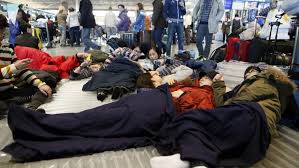The Ones Who Couldn’t Get Out
“How we view the world,” writes John Dear, “depends on where we stand. If we stand with the wealthy we will contemplate the world from the heights of privilege and domination. If, however, we stand with those who are poor and marginalized, oppressed and persecuted, then we shall contemplate the world from the experience of suffering and injustice. From this bottom-up perspective, we have a better chance of glimpsing the world as God does.”
Last night as the snow descended on New York, I waited as my flight to sunny Florida was delayed and delayed, then delayed again for hours until finally the red words appeared on the screen: CANCELLED. It was nine o’clock at night.
Hundreds of us hurried into long lines to rebook our flights. There were no meal or hotel vouchers because the cancellation was due to weather.
Countless other flights had been wiped out, so JFK was surging with crowds who did not know where to go, where to find a room for the night. Airport personnel handed out long lists of nearby hotels. We called. We went online.
Somehow I found a hotel for $189.00 and grabbed it. But I overheard a man next to me turning down a room. It was too much.
I needed a cab. I got into a queue that stretched the length of a city block and finally paid $36.00 to be driven to a hotel slinking between two warehouses. But the bath was hot and the bed was clean. I ordered a pizza for $18.00. It was midnight.
The next morning I caught a shuttle back to the airport. I was hungry. I got a coffee, an egg sandwich and a banana for $16.00 and headed for my gate.
Then I saw them all. The people who never made it out. They had airline-issued pillows and thin red blankets the size of a shawl. They were sleeping on the floor. Women old enough to be my mother were curled up in corners, trying to find some privacy, some decency. Beside them were empty bags of Cheetos and Coke bottles. They did not have the $275 I had spent to have a decent night.
We can’t always even out the disparities of life. Anyone who has lived or worked in a city knows the daily frustration of walking by people who are homeless or hurting. Sometimes we can stop and help. Often we cannot. Yet even if we cannot address every suffering and injustice, we can let the ache reach our hearts, so that we never let ourselves go numb and unresponsive.
Never let your heart stop feeling the suffering of others. It is the only thing that makes us human, the only thing that makes us a little more like God, the compassionate one.

Thanks, David. It made me think again of those who spend not just one night but every night like that.
David, This brings back many memories of the same thing all over the place.
Hope you have a hughly better experience from here on out! Blessings clark
“Never let your heart stop feeling”. Compassion is the most intimate thing one can have, a coming into relationship. Putting on their shoes isn’t enough. Compassion demands that we put on everything they are. And I’ve been discovering that it only comes from the Divine inflow. And if you knew what a sorry shape my heart was in a few years ago, you could see how “perfect” the events in my life have been to bring me to this feeling. Lent seems to be a good season to remember not only God’s compassion towards us, but our need to be compassionate towards Him.
I really like this David. You didn’t pretend to be a martyr – you had the means and you spent it on a comfortable bed and a hot shower. I don’t know if guilt entered the equation for you when you saw the terminal sprawl the next morning, but I feel that emotion a lot when I think of all that I was blessed with before I was even born. Viewed the right way it can lead to a lot of good. Just feeling it is a good step for me because I spent a lot of my life justifying the entitlement.
Love this…
“we can let the ache reach our hearts, so that we never let ourselves go numb and unresponsive.”
Keep the empathy dial on High.